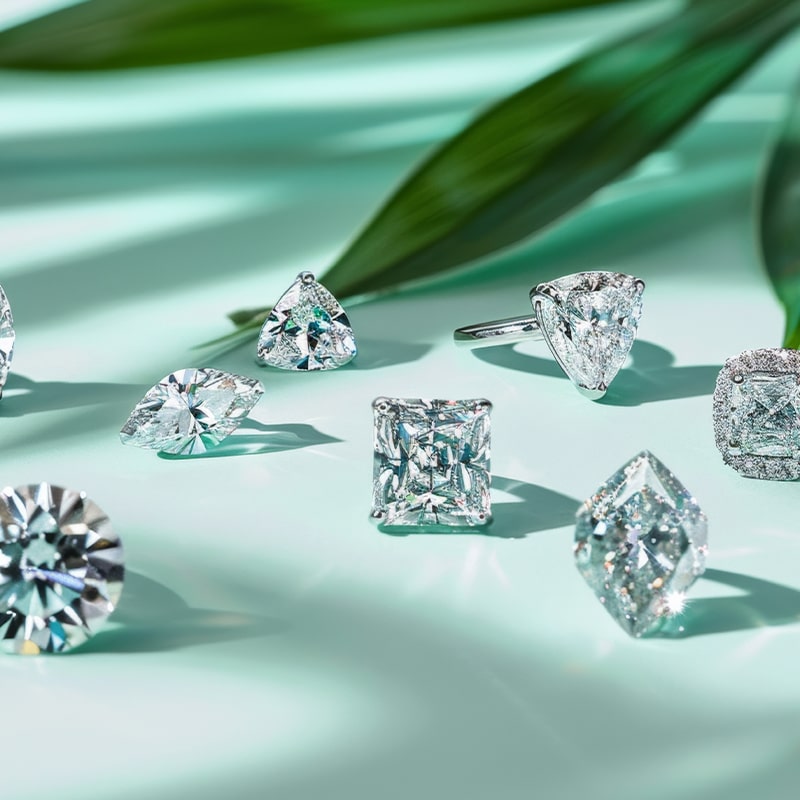The Lab grown diamonds have emerged as the new trend in the market easily replacing natural diamonds due to their efficiency. As they have properties similar to naturally mined diamonds: physical, chemical, and optical properties they provide an interesting and cost-effective solution for brilliant stone at a somewhat cheaper price. But one of the most relevant issues that people would like to know is if the laboratory diamonds keep their worth at the time of resale.
Read More: Investing in Lab Grown Diamond is Good? A Complete Guide
So, to find the relevant answer to this query let us proceed with the comparison of lab-grown diamonds with natural ones, analyzing the issues related to the value stability and offering complete information about the resale of lab-grown diamonds.
Read More: Are Lab Grown Diamonds Worth Buying?
Comparison with Natural Diamonds
Lab-created diamonds and natural diamonds cannot be distinguished by an unaided eye but there exist some features that define their resale value. Here's how they compare:
A. Market Perception and Its History
Diamonds have always been cherished for their elegance for many years, and are among the signs that measure your wealth. Such a perception over the years has ensured that natural diamonds have a reputable resale market. Lab-grown diamonds however are a more recent entry into the market, with their importance being fairly good. They have been slowly becoming popular, but they are not yet as widespread as natural diamonds, and they have no tradition behind them.
Read More: What are the Pros and Cons of Lab-Grown Diamonds?
B. Rarity and Scarcity
Diamonds are scarce in their natural form adding to their value. Organic diamonds are mined raw stones and they are each different – for they are born deep within the earth over billions of years under immense pressure. This is a natural process and since natural and superior quality diamonds are scarce in the market, people push the demand and the worth of such diamonds high. Lab-grown diamonds, however, can be made within weeks, and thus their supply can grow quickly. This affects their rarity and actual market value.
Read More: The Rise of Eco-Friendly Lab-Grown Diamonds
C. Investment Potential
 Gold Glitter Diamond Earrings
Gold Glitter Diamond Earrings As per the market research, natural diamonds are generally considered a relatively long-term investment that can be appreciated in the ensuing years. Some buyers regard them as a safe form of investment, and even the finest natural diamonds can be expected to be appreciated. Lab-grown diamonds, on the other hand, are mainly seen as consumables, or what could be referred to as investment pieces. Though they are good-looking and ethical, they normally have minimal resale value and in fact, like most manufactured items may show slight changes in the future.
Read More: GST on Gold Jewellery: Everything You Need to Know
Factors Affecting Value Retention
The following are some of the factors that determine the resale value of lab-grown diamonds. Knowing these can assist the buyers in making rational decisions on the products they wish to purchase.
A. Technological Advancements
The technology applied in the creation of lab-grown diamonds is constantly being refined in the current world hence, enhancing the yield and charging a lower price to clients. Such a trend means that as we move along the technology ladder in the process of producing lab-grown diamonds their prices are expected to fall. This, in turn, means that the newer superior diamonds may be placed in the market at lower prices thus exerting pressure on the existing lab-grown diamonds in the market.
B. Market opportunity and trends
Lab-grown diamonds’ prices are dependent on the market prices. At present, there is increased demand for cultured diamonds although there is no strong secondary market for the product as is the case with natural diamonds. There are simply not as many potential customers for these diamonds since they are now second-hand, and you often can sell them for very much closer to the price you paid for them than you can buy diamonds.
Read More: What is the Impact of GST on Gold in India?
C. Certification and Branding
Both man-made and mined natural diamonds need to be certified by credible gemological laboratories, for instance, the GIA or IGI. Certified diamonds nowadays are appreciated more in the secondary market because customers rely on the evaluation of such characteristics as cut, color, clarity, and carat weight. However, brands that everyone can familiarize themselves with lab-grown diamonds may fetch a better price because of the brand value.
D. Buyer Perception
18K Gold Tantalising Twist Diamond Pendant
The resale value of lab-grown diamonds depends on the perception of the buyers, extensively. Some consumers still hold on to natural diamonds as the lab-grown ones are thought to be fake and therefore cannot be considered as an investment. This preference may negatively impact the resale of lab-grown diamonds because some buyers would not want another person’s used lab-grown diamond because they can buy a new one at a cheaper price.
Lab-Grown Diamonds - Advantages and Disadvantages
Let’s take a closer look at the advantages and disadvantages of lab-grown diamonds.
1. Advantages of Lab-Grown Diamonds
A. Ethical Sourcing
The primary strength on the side of man-made diamonds is that there is no question about their ethicality. Thus, using lab-grown diamonds is free of the negative aspects of natural diamonds that are linked to the failure of the environment and the violation of human rights. This helps in doing away with issues to do with conflict diamonds and also makes the process of production friendly to the natural environment.
B. Affordability
Gold Classic Band Diamond Ring
Man-made diamonds are reasonably cheaper by about one-third to a third and a half of the prices of natural diamonds. This price difference enables the consumers to buy bigger or better quality diamonds because it is relative. The fact that lab-grown diamonds can be made at a comparatively cheaper cost than the original makes them ideal for anyone who would love to own a diamond but is shy of the high prices.
C. External Equivalent Both in Look and Finish
Cultured stones are indistinguishable physically, and optically from natural diamonds, and they have a similar chemical composition. This means that they have the same shininess, hardness as well as the clarity of the mined diamonds. Precision in growing the diamonds makes them visually indistinguishable from natural ones without the use of certain equipment, thus making lab-growns a perfect substitute for natural diamonds.
D. Customization and Availability
One key advantage that is associated with the process of producing lab-grown diamonds is the flexibility of carving. The characteristics like, color, size and shape are selected more easily by the buyers and there is no comparison to the natural diamonds. On that note, lab-grown diamonds are not endangered by scarcity of natural deposit hence it will be easier to find a diamond of your preference.
2. Drawbacks of Lab-Grown Diamonds
A. Lower Resale Value
Cultured diamonds however have been experienced to have less market value than natural diamonds which is one of the major demerits associated with cultured diamonds. Earlier it was stated that the resale market for lab-grown diamonds is not very established at the moment and the prices for these diamonds drop more rapidly in comparison with the natural ones. Possessing the lab-grown diamond also brings some downsides; the buyer should be aware of the loss that they can experience if they decide to resell the diamond.
B. Market Perception
Nonetheless, lab-grown diamonds are a fairly recent entrant in the market, and some consumers do not consider them to be as valuable as natural diamonds. This perception could impact their desirability as well as their market value when it is time to dispose of them.
C. Technological improvements and reduction of price
It is argued that methods in using the process to cultivate lab-grown diamonds are improving over time and after that, the quantity produced rises as do the prices. This is to the advantage of new buyers but a disadvantage to those who own lab-grown diamonds as the demand increases and better and cheaper substitutes enter the market.
Should You Invest in Buying Lab Grown Diamonds Available at GIVA?
INDEED – without any doubt. The reason is that GIVA completely follows the latest techniques that help in crafting the diamond in the labs. Our staff is highly skilled and trained at this job and we ensure that our diamond cuts are unique and customised exactly as per the customer demands. The main advantage of buying lab-grown diamond jewellery at GIVA is that we are ethical, our collection is cheaper than natural diamonds, and the diamonds you buy from us are indistinguishable from the natural ones. We believe that it does not matter if the diamond is lab-grown, we design jewellery that is appealing to all and will be cherished for years.



